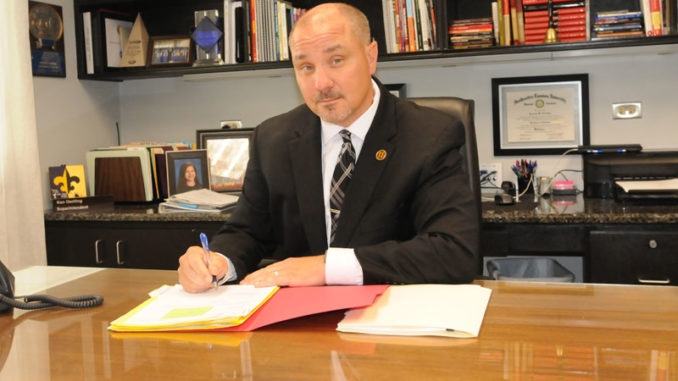
The potential of establishing Education Savings Accounts (ESAs) in Louisiana, outlined in proposed House and Senate bills, have public school superintendents statewide raising considerable objection.
The Louisiana Association of School Superintendents cited a strong position of opposition to the proposed LA GATOR Scholarship Program, as outlined in House Bill 745 and added to Senate Bill 313, which seeks to establish ESAs in Louisiana.
The Senate Education Committee approved a proposal on March 20, with an eye toward promoting parental school choice.
Committee chairman Sen. Rick Edmonds amended his education savings account bill with one proposed in the House by Rep. Julie Emerson – it would create the Louisiana Giving All True Opportunity to Rise (LA GATOR) Scholarship Program.
The program would be earmarked to launch in the 2025-2026 academic year, with student enrollment starting next March. The money would be available to families with income under 250 percent of federal poverty guidelines. For a family of four, the highest sum awarded would be $125,000 annually.
In later years the requirements would loosen until the program becomes available to all families by the 2028-2029 school year.
Thirteen other states have established ESAs, including Arizona, Arkansas, Florida, Indiana, Iowa, Mississippi, Montana, New Hampshire, North Carolina, South Carolina, Tennessee, Utah and West Virginia.
The program would theoretically be funded by taxpayer money, and it has public school leadership concerned.
“First and foremost, the LA GATOR Scholarship Program poses a significant threat to the stability and viability of our public school systems,” a letter written by the superintendents’ association states. “By directly or indirectly diverting public funds from traditional public schools and into private accounts, ESAs undermine the financial resources essential for maintaining high-quality education for all students.
“This appropriation of public funds could exacerbate existing funding challenges that many public schools and the state are projected to face next year. For public schools, this could lead to increased class sizes, reduced resources, and limited educational opportunities for our students. As public school systems, we must protect the dollars our parishes’ constitutions and voters have committed to public education. Diverting public dollars to private schools and other programs through ESAs without fully funding public schools disadvantages our students and schools.”
Dr. Ken Oertling, St. Charles Parish Public Schools superintendent, expanded on the stance, pointing out that a voucher system is already in place, with $42 to $43 million appropriated for that program with the intent of economically disadvantaged students to attend private or parochial schools using those funds.
Oertling said he is for parental choice of where to send a child to school. The potentially expanded use of public taxpayer funds – and potential diversion away from funds supplying public school resources – is where the pushback comes in, particularly if these alternative school choices are not held to the same standards as public schools.
“When you use public funds, in my opinion and in the opinion of many, you should have accountability tied to it and be held to the same standards,” Oertling said. “How can a parent decide what is best for their child if you’re not comparing apples to apples.
“It needs to be the same diploma standards, the same tests … all should apply.”
The lack of accountability outlined in these bills, Oertling said, further creates the potential to misuse taxpayer dollars and undermine efforts to ensure that all students receive a quality education.
Another concern is that while there is no specific outline of where the funding will be drawn from, the potential is it could come at the expense of funding going to the state’s public school systems.
“In St. Charles Parish, we have historically supported our public school system. We’re required to educate every child that comes through our doors. And legislation, millages have been passed over a long period of time which provides us the revenue to provide high quality educational opportunities for our kids, be it through arts, academics, supporting children with special needs or special populations of students, providing excellent athletic programs and facilities, and to be a place where people come to work and retire,” Oertling said. “We have to protect the appropriation of funds that are directed and voted upon in this parish to support public schools and protect it vehemently.”
Another major concern is the potential to further the educational divide that leads to less opportunity for economically disadvantaged families. While the stated purpose of these measures is to assist those families, Oertling contends that it hasn’t been the case elsewhere.
“If they give a child $2,300 and the family wants to send them to a private school that charges $15,000, how are they going to come up with that money if they’re economically disadvantaged? What we see and what’s been proven in other states is that who can afford to send their children are the more affluent families and (the funding) ends up being supplemental to the money they’re already paying,” Oertling said.
He added that these alternative schools can also choose to not enroll a child at their discretion, unlike public schools.
“They do not have to open their doors to provide support … you potentially end up slamming the door on the disadvantaged,” he said.





